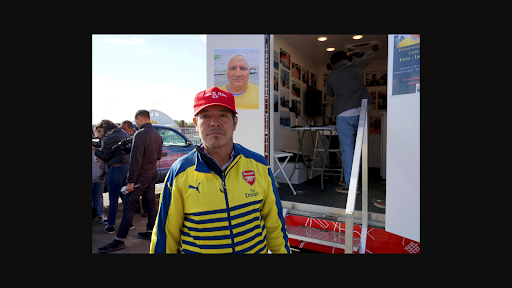
On Feb 26th, 2020, the Humanities Truck, alongside a group of my Latino Labor Community Based Learning class, and members of Trabajadores Unidos de Washington, DC (TUWDC), visited the day laborers at the parking lot at the Home Depot. This is a site where day laborers congregate daily in search for work. Around coffee and donuts, there were conversations regarding possible projects to involve this particular community. However, when the pandemic hit in mid-March, most truck activities came to a halt. Several projects could not be completed, but new opportunities emerged to continue our work both with TUWDC and Food For All-DC, (FFA) a new community partner.
Today, the day laborer community in Washington, DC, is of about 400 people, according to a report by TUWDC. Among the day laborers, there are construction workers, waiters, house cleaners, haulers, and gardeners. At the parking lot of the Home Depot alone, a regular Spring day normally sees 200 day laborers. Since last Spring, fear of the virus and a great reduction in informal hiring means that only 50 come to the site on a given day.
News reports early in the pandemic presented a grim picture of the effect of the pandemic, both in health and the economy, on minority populations across the U.S. The day laborer community has seen the first hand effects of the situation. Given the long time collaboration between TUWDC, the day laborers and AU students through my courses and projects, it was only fitting to use our resources to lend a hand in this unprecedented time.
By mid-July, American University granted permission for the Humanities Truck fellows to use the truck for food relief and other community assistance purposes. From July 17th, and almost every Friday noon since, I drive the truck to FFA where volunteers help pack 50 bags of groceries and then load them to the truck. Sometimes, members of TUWDC or AU students aid in the task. Then, I drive off to the parking lot of the only Home Depot in DC to deliver the bags.
The distribution at the site is orderly and quick. A day laborer usually assists in organizing his colleagues in a line and he hands the bags in to each day laborer making sure that priority goes to the elderly and those with children. All this while keeping social distance and wearing masks when approaching the truck.
The day laborers are grateful for any food, but are most happy when they receive rice, corn meal, beans, oil, pasta and milk. Seasonal produce is sometimes also available. Peter Sage from FFA says that when they bag groceries, they try to be ethnically aware. Some days, however, they bag what they are given. Some of the day laborers are not familiar with certain types of food, but they take it any way in hopes that somebody explains how to prepare it.
The pandemic has hit the day laborer community hard but they continue their search for labor undeterred. Most of all, they continue to reclaim the parking lot as both a site of hope for labor and as a socialization space. That is why when one of them passes away, a memorial is in order. Cándido López had been a day laborer at the parking lot for many years. He was on his way home when a police car fatally hit him. I had seen him a few months back proudly sporting a bright red baseball cap with the inscription “LOCK HIM UP”. He told me he had paid $1.00 for it.


On Friday, November 20th, we worked with TUWDC in organizing a memorial to honor him. Dan Kerr printed two large photos for the memorial, one of which went to Cándido’s son. The other went to a member of Cándido’s church for their own memorial. About 70 people gathered that day to remember their friend. Around coffee, pastries, and friends of the community, TUWDC took the opportunity to remind the day laborers of their commitment to take care of that space, to preserve it and keep it clean in order to avoid harassment from the parking lot owner or the police. I distributed the grocery bags once the memorial ended.
The Humanities Truck is now a very familiar site at the parking lot. It has allowed me to consolidate a partnership that has been years in the making. Along the way, new partnerships are formed and new friends join in and there will be living histories to record!

